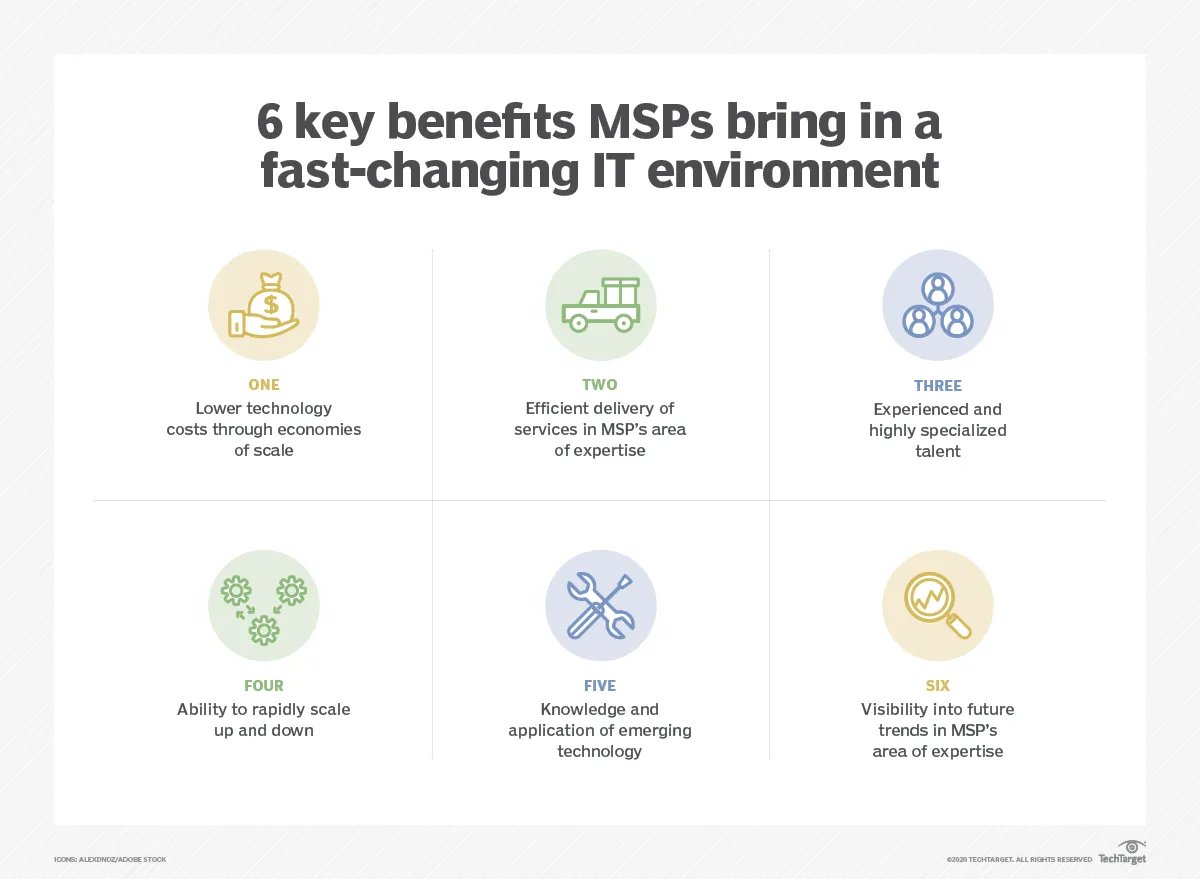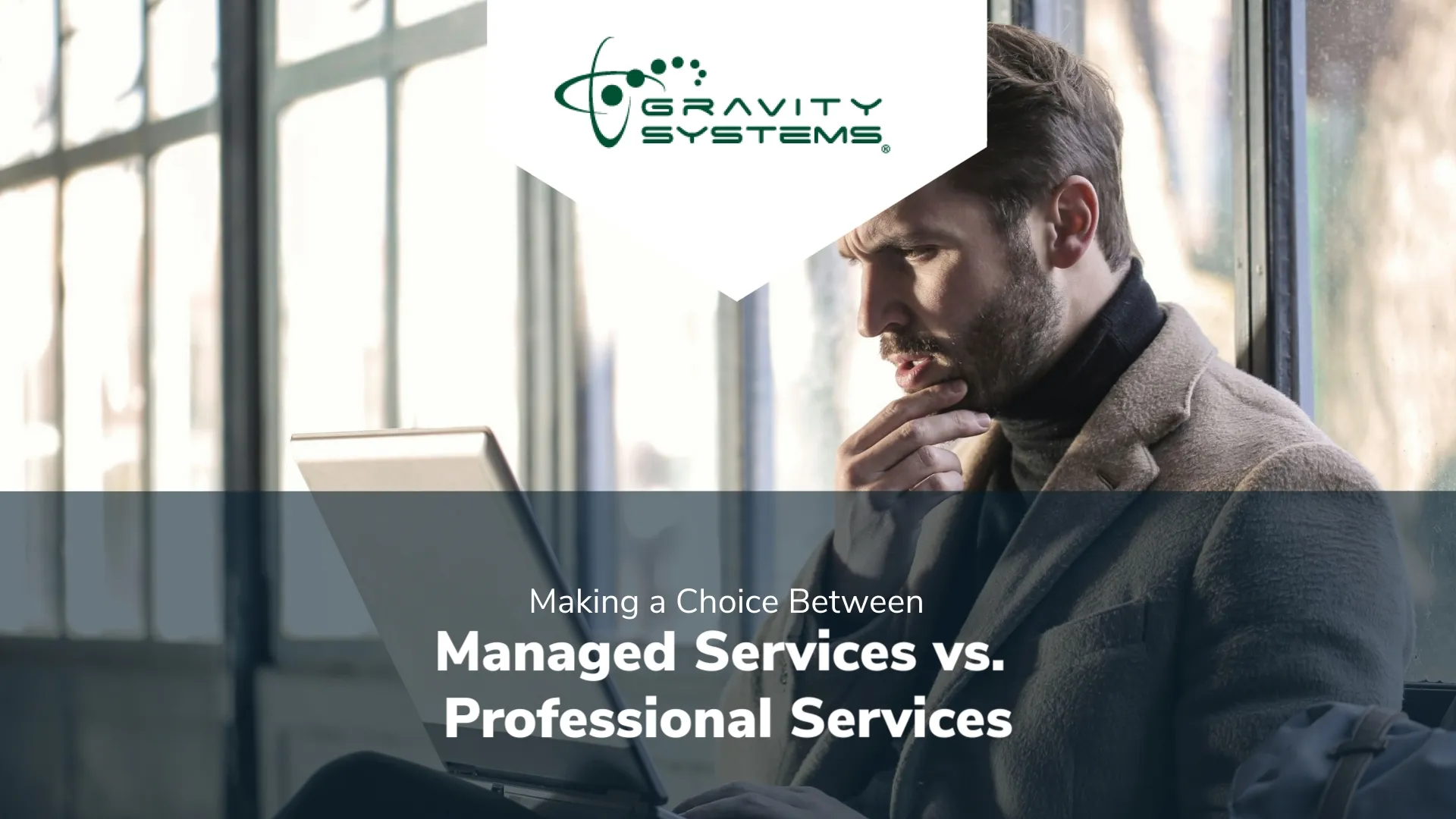Managed Services vs. Professional Services: A Closer Look
A recent report by Mordor Intelligence estimates the size of the IT Outsourcing Market at USD 617.69 billion in 2024 and is expected to reach USD 806.53 billion by 2029.
This surge underscores a significant trend in the IT industry: businesses are increasingly turning to external services to manage and enhance their IT infrastructure.
At this juncture, a critical decision looms for companies - choosing between managed services vs. professional services.
|
As Kent Morris, President of Gravity Systems, says, “This choice isn't just a matter of preference; it's a strategic decision that can shape a company's IT trajectory, impacting everything from daily operations to the success of major projects.” |
Understanding the nuances of each service model is essential in leveraging external expertise effectively, ensuring businesses align their IT strategies with their broader organizational goals. So let’s get into it.
What are Managed Services?
Managed services refer to the practice where businesses entrust their IT operations and tasks to an external service provider, known as a Managed Services Provider (MSP). These services are designed to handle the day-to-day management of IT systems, offering a turnkey solution to businesses looking to offload the operational burden of maintaining their IT infrastructure.
Typically, managed services include comprehensive solutions like network monitoring, data backups, cybersecurity protections, system updates, and support services. The key aspect of managed services is their proactive nature – MSPs continuously monitor and maintain their clients' IT environments to prevent issues before they escalate into major problems.

Managed Services Pros & Cons
Pros:
- Cost-Effectiveness: Managed services often come with fixed monthly fees, providing businesses with predictable IT expenses.
- Reduced Downtime: Continuous monitoring and proactive maintenance lead to fewer IT issues and less downtime.
- Access to Expertise: Businesses benefit from the extensive knowledge and experience of the MSP without the cost of hiring in-house experts.
Cons:
- Limited Customization: Managed services may offer less flexibility in terms of tailored solutions specific to a business's unique requirements.
- Dependence: Relying on an external provider can sometimes lead to a feeling of lost control over certain IT functions.
- Contractual Obligations: Managed service contracts often require a long-term commitment, which can be a disadvantage if business needs change.
Looking for Ongoing IT Management?
Explore our managed services for continuous, hassle-free IT support.
Get Started
What are Professional Services?
In contrast to managed services, professional services are typically project-based and focus on solving specific, often complex, challenges within an organization. These services involve an initial consultation to understand the project's scope, followed by the deployment of skilled professionals to develop and implement a tailored solution.
Professional services cover a wide range of activities, including IT consultations, system integrations, custom software development, and advanced project management. These services are typically sought after for unique, one-time projects that require a high level of expertise and customization.
Professional Services Pros & Cons
Pros:
- Tailored Solutions: Professional services are highly customized to meet the specific needs and goals of a business.
- Expert Skills: These services provide access to specialized skills and knowledge that may not be available in-house.
- Scalability: Professional services can scale up or down based on the project's requirements, offering great flexibility.
Cons:
- Higher Costs: The specialized nature of professional services often comes at a higher cost compared to standardized managed services.
- Time and Resource Intensive: These projects can require significant time and resources to manage effectively.
- Limited Duration: Once the project is completed, the service ends, which might require businesses to seek additional support for maintenance.
Managed Service vs. Professional Services: What are the Differences
|
Feature |
Managed Services |
Professional Services |
|
Duration |
Long-term, ongoing |
Short-term, project-specific |
|
Focus |
Day-to-day operational support |
Specific, one-time project goals |
|
Cost Structure |
Fixed, predictable fees |
Variable, project-dependent |
|
Customization |
Standardized solutions |
Highly customized solutions |
|
Expertise |
Broad, general IT support |
Specialized, niche skills |
|
Ideal For |
Continuous IT operations |
Unique, specific challenges |
Key Factors in Making the Choice Between Managed vs. Professional Services
Deciding between managed and professional services depends on various factors:
- Nature of Business Needs: Opt for managed services for ongoing, operational IT support or professional services for specific, one-time projects.
- Budget Constraints: Consider whether predictable, fixed costs (managed services) align better with your financial planning than variable, project-based costs (professional services).
- Desired Level of Control and Customization: If your business requires highly tailored solutions and prefers closer control over IT projects, professional services may be more suitable.
- Strategic Focus of the Business: If your business strategy emphasizes continuous improvement and evolution in IT infrastructure, managed services may be more suitable. If your strategy involves specific, one-off IT upgrades or implementations, professional services are more appropriate.
|
More resources you might like: |
- Internal IT Expertise: Evaluate your in-house IT capabilities. Businesses with limited or overburdened IT staff may benefit more from managed services. Professional services are ideal if you have a robust IT team but require additional expertise for a particular project.
- Risk Management Preferences: Managed services can offer better risk management for IT operations through regular monitoring and maintenance. This is crucial for businesses that cannot afford downtime or security breaches. If the risk is tied to a specific project or implementation, professional services provide expertise to mitigate these project-specific risks.
- Scalability and Growth Trajectories: For businesses anticipating rapid growth or significant scaling in the near future, managed services offer the flexibility and scalability to accommodate this growth. Professional services, however, are more suited for businesses looking to complete discrete projects that align with their current scale and growth phase.
- Compliance and Regulatory Requirements: If your business operates in an industry with stringent compliance and regulatory standards, managed services may provide the continuous oversight and updates necessary to maintain compliance. In cases where compliance needs are project-specific, professional services can offer the specialized knowledge required for those compliance needs.
- Long-term vs Short-term Focus: Managed services are generally more aligned with a long-term strategic approach, offering ongoing support and evolution. Professional services, conversely, are more about addressing immediate, short-term objectives or challenges.
Make the Choice Most Suitable For Your Business With Gravity Systems By Your Side
The choice between managed services and professional services is more than a tactical decision—it's a strategic move that shapes your business's IT landscape and future growth.
In this ever-changing IT environment, aligning with the right service model is crucial for enhancing efficiency and scalability.
|
Explore our range of IT services in Austin: |
If you're weighing the benefits of a managed service provider, consider partnering with Gravity Systems and witness our proven track record in elevating IT infrastructures. With 26 years of expertise in the field, we offer you a comprehensive analysis of your IT needs and tailor solutions to propel your business forward.
Contact us today for a free consultation and take a proactive step towards refining your IT strategy and ensuring your business's success in the digital age.






